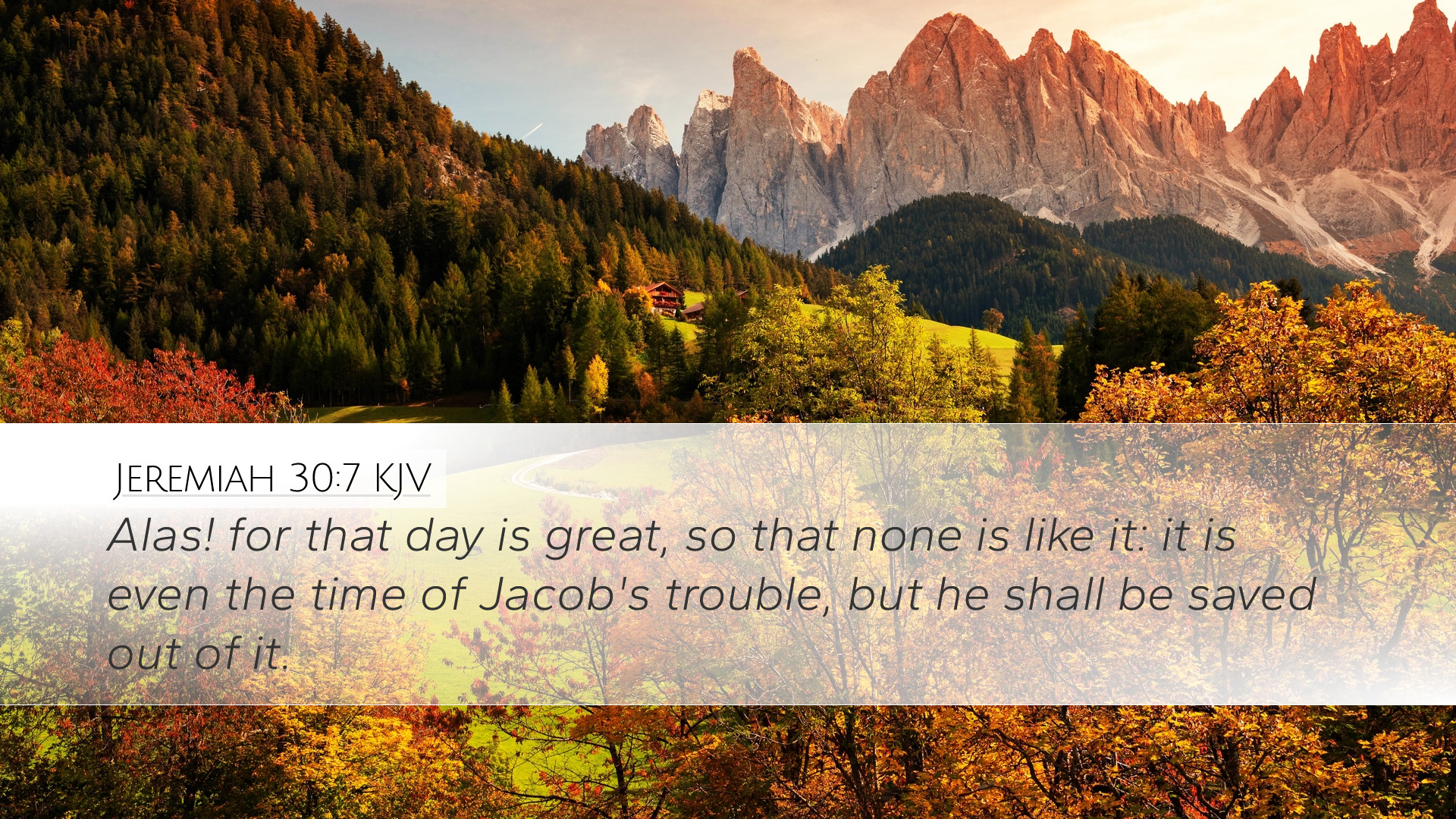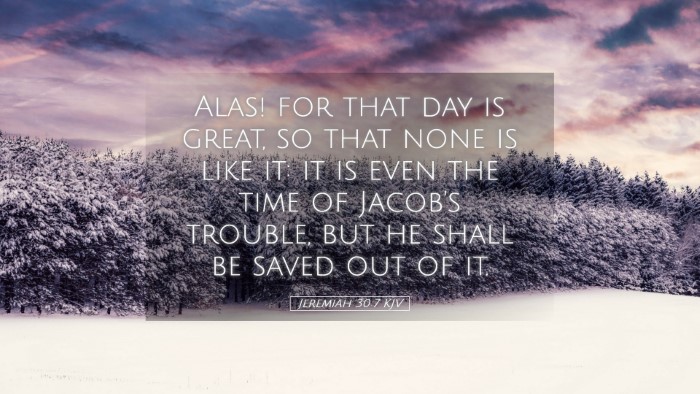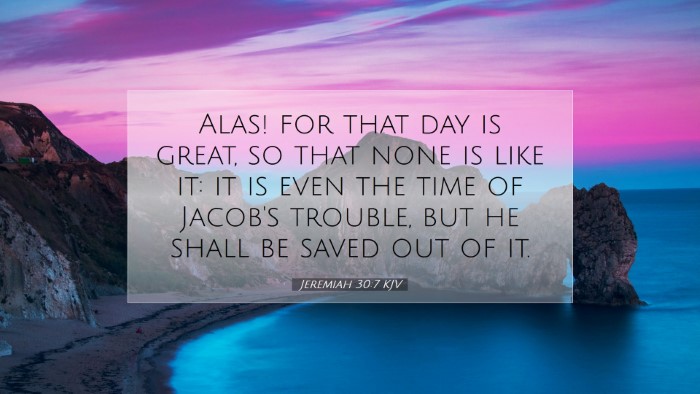Commentary on Jeremiah 30:7
Verse: "Alas! for that day is great, so that none is like it: it is even the time of Jacob's trouble; but he shall be saved out of it."
Introduction
This prophetic declaration in Jeremiah stands as a pivotal focal point in biblical eschatology, referring specifically to a time of immense distress characterized as "the time of Jacob's trouble." This commentary aims to explore the-depth insights derived from various public domain commentaries by Matthew Henry, Albert Barnes, and Adam Clarke, giving a comprehensive understanding valuable for pastors, students, theologians, and Bible scholars.
Exegesis of the Text
The phrase "Alas! for that day is great" reflects a profound sense of lamentation and foreshadowing of the impending turmoil. The intensity of the phrase indicates that the day referred to is not ordinary, but rather significant in biblical history and prophecy.
Contextual Background
To understand the full implications of Jeremiah 30:7, it's crucial to look at its historical and cultural context. This passage speaks of the consequences of disobedience among the people of Israel, as well as their subsequent restoration. The "time of Jacob's trouble" refers to a period of suffering and tribulation that the nation must undergo before experiencing redemption.
Historical Context
Matthew Henry notes that this verse not only addresses the immediate historical context of Israel's exile but also serves as a prophetic foreshadowing of future tribulations that the nation is to undergo. The historical significance cannot be ignored as it directly points to the Babylonian captivity and the troubles faced by the Israelites.
Theological Significance
Albert Barnes elaborates that "the time of Jacob's trouble" signifies a collective hardship that besets the Israelite community. It is both a reminder of their past transgressions and a call to future hope. The trouble signifies the trials that lead to repentance and eventual salvation.
Interpretation of Key Phrases
- "Great Day": The mention of "that day" as "great" implies not only intensity but a unique position in eschatological events. Adam Clarke emphasizes that such a day is unparalleled and marks a definitive point in prophetic fulfillment.
- "Time of Jacob's Trouble": This phrase encapsulates a period of intense tribulation specifically for the descendants of Jacob (Israel). Clarke indicates that the difficulties faced will purify and facilitate repentance for God’s chosen people.
- "He shall be saved out of it": The latter part of the verse provides a contrasting hope to the distress outlined earlier. Henry asserts that despite the intense trials, God’s promise of salvation is assured, emphasizing His eternal faithfulness to His covenant people.
Applications for Today's Believers
The implications of this verse extend beyond the historical context and resonate deeply with contemporary believers. The experiences of sorrow and trouble in our lives echo the sentiments found in Jeremiah 30:7.
Lessons on Perseverance
This passage encourages believers to recognize that trials have purpose. Albert Barnes posits that through tribulations, believers are called to remain steadfast, reminding us that our temporary struggles are part of a larger narrative leading to redemption.
Hope in Distress
Emphasizing God's faithfulness, this verse affirms to us that deliverance is assured. Adam Clarke notes that believers must hold on to the promise of God's salvation and deliverance in times of hardship, paralleling the Israelites' experience to our own trials.
Understanding Redemption
As Jeremiah speaks to Israel's future, it serves as a reminder for modern believers of the overarching theme of redemption throughout scripture. God's unyielding commitment to His people, even amid their failures, is a central theme that resonates powerfully from this verse.
Theological Reflections
Jeremiah 30:7 invites deeper theological reflection on the nature of God’s justice and mercy. The juxtaposition of trouble and deliverance speaks volumes about the character of God: He disciplines but also saves.
The Doctrine of Providence
Every struggle and every period of waiting holds divine purpose. Matthew Henry asserts that understanding God’s providence helps believers navigate their own "Jacob's troubles," knowing they are not abandoned but instead undergoing God's refining process.
Eschatological Perspectives
This passage also invites exploration into eschatological themes. The "time of Jacob's trouble" has implications related to end-times theology where believers await the ultimate salvation that the coming of Christ promises. Albert Barnes affirms that this verse sheds light on God’s plan unfolding through history.
Conclusion
In conclusion, Jeremiah 30:7 serves as a profound testament to God's faithfulness amidst strife. This commentary synthesizes insights from Matthew Henry, Albert Barnes, and Adam Clarke, aiming to provide a holistic view for pastors, students, theologians, and Bible scholars alike. It encourages readers to reflect on the nature of their tribulations while holding fast to the assurance of God's salvation and restoration.


